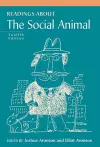
Readings About The Social Animal
2 authors - Paperback
£80.99
Marti Hope Gonzales earned her Ph.D. in 1987 at the University of California at Santa Cruz, where she worked with both Elliot Aronson and Thomas Pettigrew. An Associate Professor of Psychology at the University of Minnesota, she is a Horace T. Morse-Minnesota Alumni Distinguished Teaching Professor, and has won teaching awards from the University of Minnesota, the Minnesota Psychological Association, and the state of Minnesota. Marti is coauthor, with Elliot Aronson and Phoebe C. Ellsworth, of Methods of Research in Social Psychology (2/e). Her research interests include interpersonal conflicts and the personal and social benefits of mediation, political psychology, and self-presentation, and she has published empirical work in both basic and applied research journals in social psychology. Minnesota weather permitting—and it seldom does—she gardens and takes walks around one of the nearby 10,000 lakes with her spouse Michael and Akita Kashi. Carol Tavris earned her PhD in social psychology at the University of Michigan. In her writing, lectures, and teaching, she has sought to educate the public about the importance of scientific thinking in psychology and to educate psychologists about the importance of clear writing in psychology. Tavris has written hundreds of essays and book reviews for the Los Angeles Times, The New York Times, the Times Literary Supplement, Scientific American, and other publications, and has lectured on diverse topics in psychological science to groups around the world. Her most recent book, with festschrift honoree Elliot Aronson, is Mistakes Were Made (But Not by ME). Her other books include Anger: The Misunderstood Emotion, The Mismeasure of Woman, and, with Carole Wade, Psychology and Invitation to Psychology. She is a charter Fellow of the Association for Psychological Science and a member of the editorial board of the APS journal Psychological Science in the Public Interest. Joshua Aronson is associate professor of developmental, social, and educational psychology, at New York University. He received his Ph.D. in 1992 from Princeton University. Before coming to NYU, he was on the faculty at the University of Texas and was a postdoctoral scholar and lecturer at Stanford University. Aronson’s research focuses on the social and psychological influences on academic achievement. One of the most widely cited social scientists in the past decade, Aronson is internationally known for his research on "stereotype threat" and minority student achievement, research that offers a strong challenge to traditional genetic and sociological explanations of why African Americans and Latinos perform less well on tests of intelligence than their White counterparts, and why women trail men in hard math and science. Aronson’s research with colleague Claude Steele has been cited in two Supreme Court cases and is considered a modern classic in social psychology, with over 1800 citations in scientific publications. This research showed how stereotypes that allege lower ability among these groups depresses Black and Latino students’ test and school performance, and women's comfort and performance in advanced mathematics and science domains. Aronson has authored numerous chapters and scholarly articles on this work and is the Editor of Improving Academic Achievement: Impact of Psychological Factors on Education (Academic Press) and Readings about the Social Animal, (Worth). His current work focuses on methods of boosting the learning and test performance of underachieving youth. Aronson has received several awards and grants for his research including Early Career awards from the Society for the Psychological Study of Social Issues and the National Science Foundation, and the G. Stanley Hall Award from the American Psychological Association. He was the founding director of the Center for Research on Culture, Development and Education at New York University. His forthcoming book is called The Nurture of Intelligence.